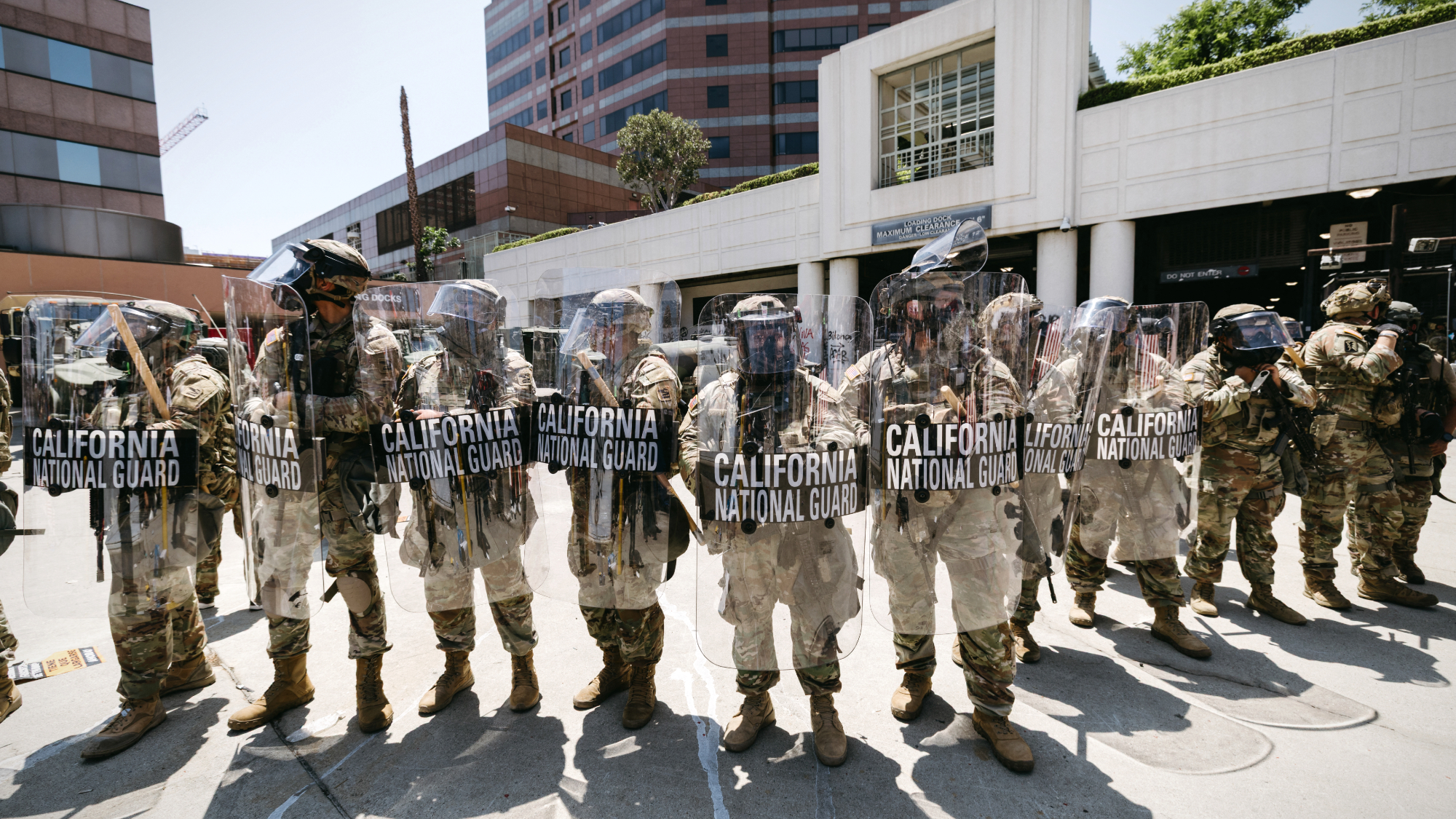How does the Alien Enemies Act work?
President Trump is using a long-dormant law to deport Venezuelans

What is the Alien Enemies Act?
It's an 18th-century law that allows the president to detain or deport immigrants from countries the U.S. is at war with. In more than 225 years, the law had been invoked just three times, always during major conflicts that had been declared wars by Congress, until President Trump triggered it in March against the Venezuelan criminal gang Tren de Aragua. He said the gang, which has spread across the Americas as millions of migrants fled Venezuela in recent years, was "perpetrating, attempting, and threatening an invasion or predatory incursion" on U.S. soil. Trump has used his authority under the law to deport more than 200 men to a prison camp in El Salvador, but he's facing pushback in the courts as legal scholars argue that the act doesn't apply in the current situation. "We haven't had a declared war," said Georgetown University law professor Steve Vladeck. "And no one has tried to argue that that invasion or predatory incursion language could be used in any context other than a conventional war."
What powers does it grant?
The act allows the president to detain and deport, without a hearing, any immigrant from an enemy nation during wartime. No evidence of disloyalty or criminal behavior is necessary. Along with the Naturalization Act, the Sedition Act, and the Alien Friends Act, it made up the Alien and Sedition Acts of 1798, which President John Adams signed into law at a time when the U.S. faced the prospect of war with France. "Whenever there shall be a declared war...or any invasion or predatory incursion shall be perpetrated, attempted, or threatened" against the U.S., it says, all "subjects of the hostile nation or government" can be "apprehended, restrained, secured and removed, as alien enemies."
Why was it created?
The point was ostensibly to root out foreign spies and saboteurs. But the Alien and Sedition Acts were also a way for Adams' Federalist Party to target the immigrants who largely supported the opposition Democratic-Republican Party. Many lawmakers denounced the laws as unconstitutional and Adams himself as a tyrant, to the point where Abigail Adams feared for her husband's safety. When Thomas Jefferson succeeded Adams in 1801, he repealed the other three parts of the Alien and Sedition Acts or let them expire, but the Alien Enemies Act remained on the books. Historian Joseph Ellis called support for the Alien Enemies Act "unquestionably the biggest blunder" of Adams' presidency.
Subscribe to The Week
Escape your echo chamber. Get the facts behind the news, plus analysis from multiple perspectives.

Sign up for The Week's Free Newsletters
From our morning news briefing to a weekly Good News Newsletter, get the best of The Week delivered directly to your inbox.
From our morning news briefing to a weekly Good News Newsletter, get the best of The Week delivered directly to your inbox.
When has it been invoked?
President James Madison first used it during the War of 1812 to require all British nationals in the U.S. to register with the government, reporting personal information such as age, address, and whether they'd applied for citizenship. It wasn't until a century later, during World War I, that President Woodrow Wilson used it against German-born male residents, registering 480,000 men and detaining over 6,000. It was last used by President Franklin D. Roosevelt during World War II to intern thousands of Germans and Italians in camps. Most of the 100,000 Japanese Americans interned were held under a different legal basis. None of these events, though, involved large-scale deportations.
Is its use constitutional?
Yes, during wartime. The Alien Enemies Act first reached the Supreme Court in 1948. In Ludecke v. Watkins, the court rejected an appeal by a German immigrant who'd been ordered to leave the U.S. in 1946. At issue was whether the war had ended by then, which would have meant the law was no longer applicable. Divided on the subject, the court concluded that the definition of "wartime" was too political for it to answer, and it upheld the deportation. Having survived this legal challenge, the act was largely ignored by the courts and Congress for decades. Yet four justices joined in a key dissent in that 1948 case, arguing that the act denied immigrants due process and constituted an effort to suppress political speech. "The notion that the discretion of any officer of government can override due process is foreign to our system," wrote Justice William Douglas. "Due process does not perish when war comes."
How does Trump justify its use?
Trump has repeatedly referred to migration to the U.S., particularly from Latin America, as an "invasion" and maintains that the Tren de Aragua gang constitutes an invading army. When asked whether he was in violation of a district judge's order to halt the deportations of Venezuelans to El Salvador, Trump said, "This is a time of war." But only Congress can declare a war, and so far, the Supreme Court has limited the deportations without ruling on whether Trump may invoke the act.
What has the court said?
The Supreme Court ruled unanimously on April 7 that any person in the U.S.— even an "alien enemy"—has the right to fight their deportation in court. Two weeks later it issued a rare, late-night order pausing deportation of a group of Venezuelans. Now it is up to each individual migrant to plead their case to a judge. But most legal scholars agree that the administration has overreached and the court should do more. "Nazis got better treatment under the Alien Enemies Act than has happened here," said U.S. Circuit Judge Patricia Millett.
Sign up for Today's Best Articles in your inbox
A free daily email with the biggest news stories of the day – and the best features from TheWeek.com
A push for repeal
Some members of Congress have been trying to undo the Alien Enemies Act since before Trump returned to office. Rep. Ilhan Omar (D-Minn.) introduced the Neighbors Not Enemies Act to repeal the law in 2021, and Sen. Mazie Hirono (D-Hawaii) introduced it again in 2023, but both times it died in committee. Two days after Trump's inauguration, Omar and Hirono reintroduced it again, and this time it was co-sponsored by over three dozen other members of Congress. It's also been endorsed by nearly two dozen groups representing descendants of those interned under the act during World War II, as well as more than 60 other civil rights, immigration, religious, and veterans organizations. Trump was still two months away from invoking the act at that point, but many already feared what might happen if the president resurrected a powerful law from the early days of the republic. "We cannot allow antiquated laws to continue enabling discriminatory practices," Omar said.
-
 Democrats: Solving the 'man problem'
Democrats: Solving the 'man problem'Feature Democrats are spending millions to win back young men
-
 Deportations: A crackdown on legal migrants
Deportations: A crackdown on legal migrantsFeature The Supreme Court will allow Trump to revoke protections for over 500,000 immigrants
-
 Trump's extremist 'brain'
Trump's extremist 'brain'Feature Stephen Miller has emerged as an unrivaled power within the White House. What does he want?
-
 Democrats: Solving the 'man problem'
Democrats: Solving the 'man problem'Feature Democrats are spending millions to win back young men
-
 Deportations: A crackdown on legal migrants
Deportations: A crackdown on legal migrantsFeature The Supreme Court will allow Trump to revoke protections for over 500,000 immigrants
-
 Stephen Miller: Trump's extremist 'brain'
Stephen Miller: Trump's extremist 'brain'Feature Stephen Miller has emerged as an unrivaled power within the White House. What does he want?
-
 Musk: What did he achieve in Washington?
Musk: What did he achieve in Washington?Feature Elon Musk leaves his government job but not after bruising his image, slashing aid and firing thousands
-
 Courts deal Trump a setback on tariffs
Courts deal Trump a setback on tariffsFeature A federal court ruled that Trump misused emergency powers to impose tariffs
-
 Elon Musk's Trump tiff could be an opportunity for Democrats
Elon Musk's Trump tiff could be an opportunity for DemocratsTALKING POINTS As two of the world's most powerful people put the final nails in the coffin of their former friendship, Democrats are split over how to best capitalize on the breakup
-
 'California is not a trivial target'
'California is not a trivial target'Instant Opinion Opinion, comment and editorials of the day
-
 Trump foists National Guard on unwilling California
Trump foists National Guard on unwilling Californiaspeed read Protests erupted over ICE immigration raids in LA county